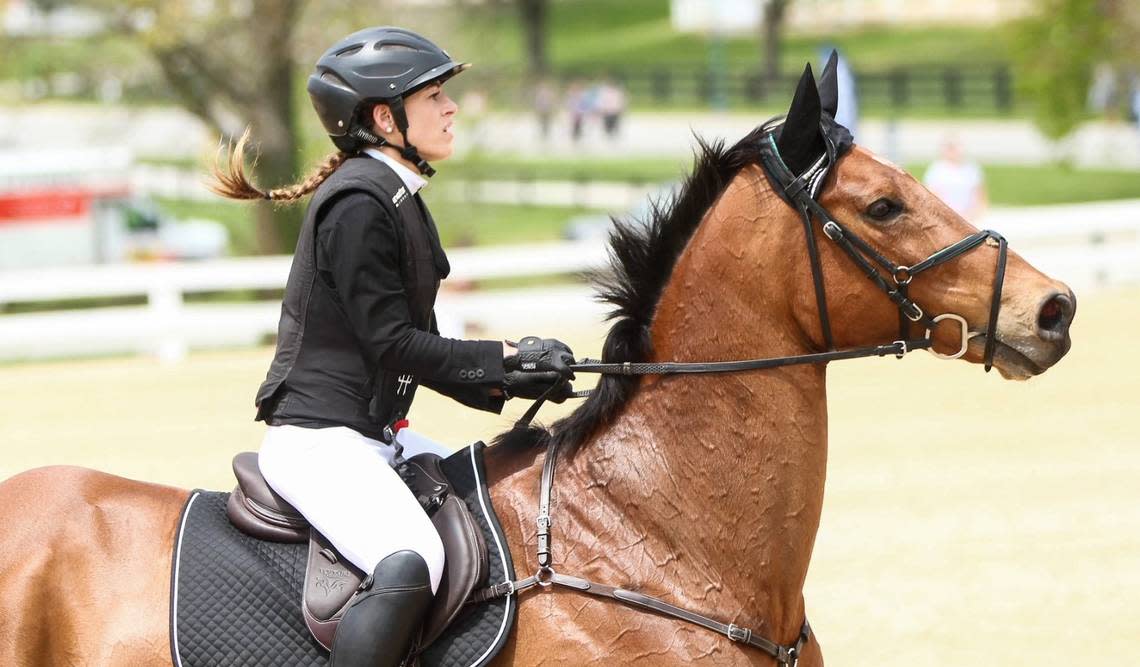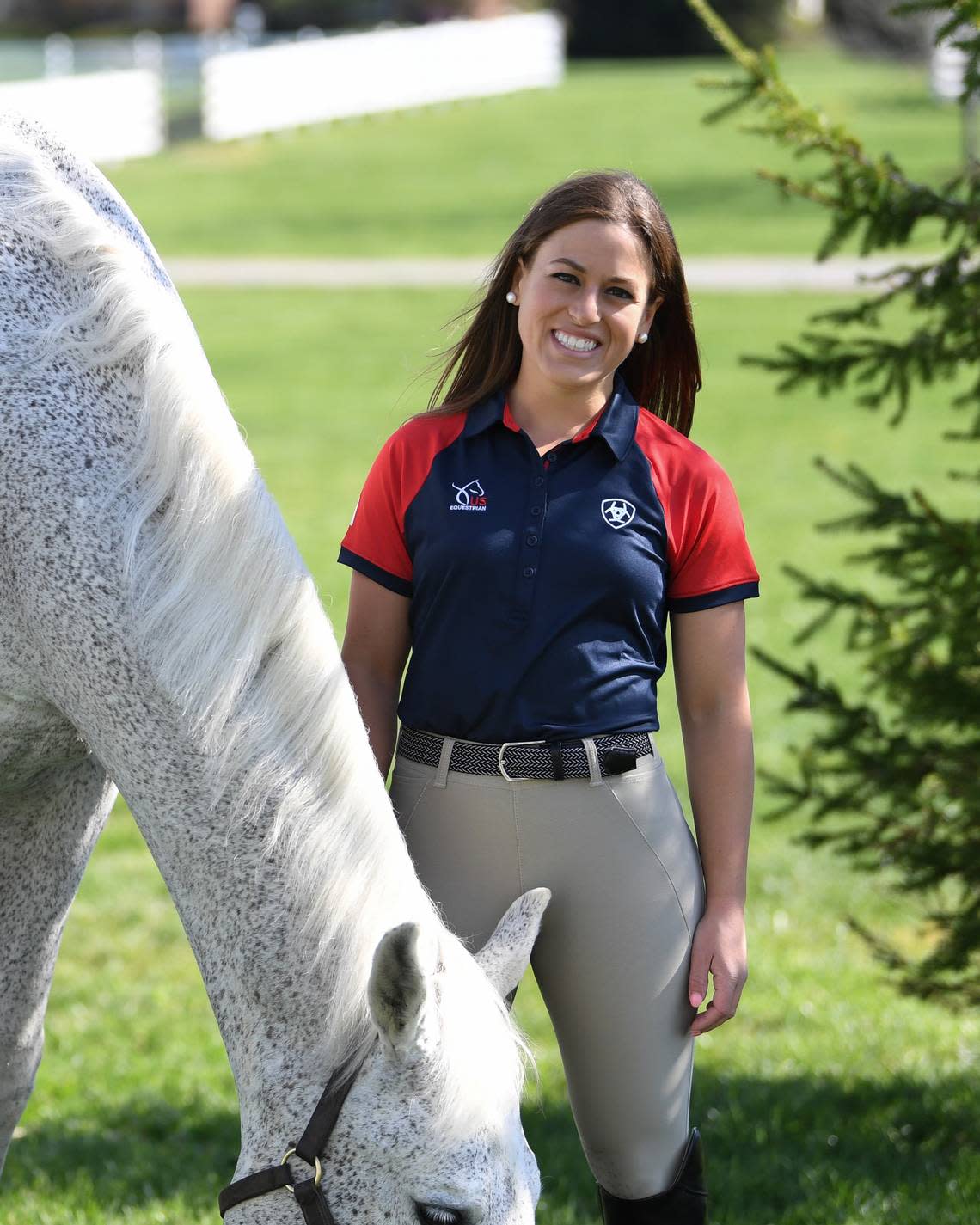She competed in her sport while legally blind. Now she fulfills dreams for others.
When equestrian Wren Zimmerman gets into a new ring, she creates a mental map of the course that other show jumpers don’t need to have.
She walks the perimeter of every new arena, making note of every quarter line and half line.
Next, her aide holds her hand at every jump so she can get a sense of where she is in relation to the center of it. Then she’ll walk the course again.
Why does she have to learn a course in such an unconventional way?
She’s legally blind.
Zimmerman, now based in Lexington, has Stargardt Disease, a rare eye disease that doesn’t cause vision loss until adulthood. The National Institute of Health estimates that anywhere from 30,000 to 200,000 people in the United States may be affected by Stargardt Disease. It’s caused by a genetic mutation and leads to progressive vision loss.
While Zimmerman is not completely blind, most of her central vision is jumbled. She has to rely on her peripheral vision to do most activities, including show jumping.
“My central vision is totally blank,” the rider described. “My peripheral vision is very, very blurry. Instead of that central vision being totally black and white, my brain uses the peripherals to guess what should be in the center part that’s blank. It creates this sparkly effect because it’s grabbing things from the left and right. It’s continuously inputting these faded colors to guess what should be in the center. Whatever lies directly in front of me, I will actually miss entirely.”
If she looks toward the horizon, Zimmerman sees a blob of green (grass) and a splash of blue (sky). But her life wasn’t always like this. Even though she’s been wearing glasses since she was 2 years old, Zimmerman was not diagnosed with Stargardt Disease until a driving incident in high school.
“The moon and the streetlights blended together and I just couldn’t see where the road was,” she recalled. “I couldn’t see the detail of the car in front of me and it was scary. I pulled over and called my parents and said, ‘Can you come pick me up? I can’t see.’”
Despite her diagnosis, Zimmerman continued with most activities. She went on to graduate from Queen’s University in Canada with a degree in human geography. She had also begun riding horses at a therapeutic riding center to fulfill a childhood love.
“Ever since I was little, I was obsessed with horses. I would see a horse on the side of the road and want to stop and look at it,” Zimmerman recalled.

While she was finding joy in her post-diagnosis world, things slowly shifted. It wasn’t until graduate school when she realized that Stargardt Disease would prevent her from leading the life that she originally planned. The accommodations she required made succeeding in business school extra challenging.
“I use a large TV screen that I connect to my computer,” she explained. “Not being able to have that on the go and having to work through the sheer amount of coursework, databases and finance projects became incredibly difficult. That’s when I really started realizing that the path I was on was not impossible, but it was incredibly difficult. ”
That’s when Zimmerman found herself considering an alternative career path — show jumping. To date, she’s competed in multiple competitions against able-bodied riders. While she didn’t initially need accommodations, Zimmerman’s aide helps her learn courses prior to competition days.
The United States Equestrian Federation has been supportive of Zimmerman’s efforts to compete through her vision impairment
“USEF’s vision is to bring the joy of horse sports to as many people as possible,” USEF’s Vicki Lowell said. “We applaud Wren’s commitment and passion for show jumping. Sharing her story inspires others to consider what is possible.”
Zimmerman recently retired her horse, Cassicasca, and hasn’t competed since, but she’s been in talks with the USEF and other organizations about how to make show jumping more inclusive for the disabled community. She’s even been in touch with the international equestrian sports organization, or the Fédération Equestre Internationale, about her cause.
Ultimately, Zimmerman wants to make show jumping an officially recognized Paralympic sport.
“I can only imagine the people out there that have a disability or other challenges they face that get feedback that makes them not want to pursue what they love,” Zimmerman explained. “That for me was kind of a realization over time. By having a disability myself, I have the power — the power to change lives of other people.”
According to the International Paralympic Committee’s website, “any sport that wishes to be considered for the Paralympic Games must apply at least seven years before the Paralympic Games in question.”
If show jumping was to be submitted as a potential new sport, then the earliest it could appear in the Paralympic Games would be in the 2032 Games in Brisbane, Australia. The IPC website also states that potential new sports are evaluated on “the principles of “quality, quantity and universality.”
“There are a lot of conversations about things potentially happening,” Zimmerman’s aide and partner Nick McMillen said. “It’s just a matter of time and organizing those for people to actually pick those up.”
Zimmerman is gaining traction within the riding community and is continuing to have conversations with official governing bodies. She recently spoke to representatives of the World Equestrian Festival, which is one of the largest equestrian events in Europe.

While Zimmerman is celebrating these milestones along the way, she knows that her job doesn’t end after show jumping is officially a Paralympic sport.
“All of these things are adding up to this big goal of actually having show jumping recognized as a Paralympic sport, but it doesn’t stop there. Once that happens, then you go into the programming and actually starting to get athletes riding and competing to ensure the long-term success of this whole program.”
Despite not currently competing as an active rider, Zimmerman has no problem going through the arduous process of trying to get show jumping into the Paralympic Games. Why? According to her, the answer is simple.
“If I can help, even in a little way, change this or pave the path for others to be able to do this easier, then why not?”
